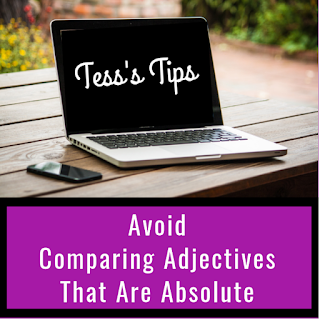This post is a continuation of the tips I discussed in my last post about avoiding errors in adjective and adverb comparisons. Click here if you missed it.
Today, we are going to take a look at adjectives that are absolute in their meaning, and they cannot be compared by using the comparative or superlative degree. Absolute adjectives stand alone.
Usually, when two things are being compared we use the comparative
degree. When more than two things are
being compared, we use the superlative degree. Sometimes, however, the meaning of
an adjective is absolute, and it cannot be compared.
Some examples of absolute adjectives include: absolute, round, straight, square,
perfect, and unique.
Incorrect: My score on the exam was more perfect than anyone
else’s.
Correct: My score on the exam was perfect.
Probably the most abused of these words is the adjective unique.
By definition it means there is only one of its kind, so it
cannot be compared to another.
Incorrect: Your story was more unique than mine.
Correct: Your story was unique.
A less frequently used definition of the word unique is unusual. If, when you use the word unique, you mean that something is unusual, it is all right to compare it. It would be better, however, to simply use the word unusual.
For more information on the comparison of adjectives and
adverbs, check back here soon. My next post will be tips to help you avoid using sweeping generalizations when making comparisons. A sweeping generalization creates a statement that is too broad.
I hope you are having your best school year ever!
Visit my store for more helpful lessons in grammar and
usage. Many of the lessons are free.
Thanks for reading,




